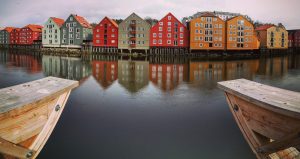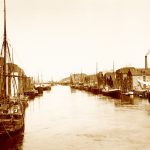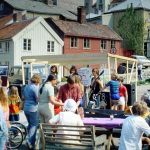When cities leverage their heritage for development, there is the possibility of gaining their investment back in social and economic dividends. Investing in cultural heritage can make a location more attractive for tourism, new residential growth and business investment – changing the landscape of a community and the way people interact with it.
I recently attended a webinar on this topic offered by EUROCITIES, an economic, political and social development network connecting many of Europe’s major cities.
Experts spoke to their experience of social and economic returns on cultural heritage investment, including finding balance between social and economic benefits of urban renewal and the negative effects of gentrification and over-tourism.
When considering cultural heritage as a tool for development, this was a very interesting concept and it got me thinking – as memory institutions, where do libraries fit into this?
Urban Transition in Bakklandet
This discussion focussed on heritage and social and economic valorisation – that is, the process of creating social and economic value from cultural heritage resources.
The example I’d like to focus on is from the Bakklandet neighbourhood of Trondheim, Norway. Today this area is a must-see for tourists in the city, who enjoy the traditional wooden architecture, colourful buildings, and plentiful cafes.

Colourful buildings in Bakklandet (photo by darolti dan on Unsplash http://bit.ly/3bc3xVI)
However, this was historically a working-class area, which in the 1960s faced the threat of being demolished to make room for a highway. The neighbourhood was saved by locals, whose grassroot campaigning successfully opposed the demolition plans. Given this history, the area for a long time has been home to a deeply engaged local population.
Bakklandet is now in a period of urban transition – valued by tourists for its cultural capital, and therefore valued by investors and businesses for its economic potential.
How does a city in transition balance the benefits that economic returns on heritage can bring while preserving authenticity and social capital for residents?
I would argue one answer lies in libraries, as memory institutions and as public spaces.
Third-Party Preservation of Memory
I wondered if there was any information in this case study on the role of libraries and archives in keeping local’s connection to culture at the heart of Bakklandet’s transition.
The speaker from the Norwegian University of Science and Technology who presented this case study informed me that residents themselves have taken action to record the history of their community.
Locals have created an online archive, rich with historic photos and stories about the neighbourhood’s long history, alongside current news and events connecting residents to one another.
The speaker referred to this repository as a third-party preservation of memory. It is a wonderful blend of memory, history and social connection. It is a community centered around a deep connection to its neighbourhood, preserving its memory and building social capital among its residents.
Check it out here (in Norwegian): https://blvel.wordpress.com/hjem/bilder/
- From the archive, the Bakklandet neighborhood, 1910 (photo: bit.ly/2vfnPwV)
- The Bakklandet neighborhood, 1981 (photo: http://bit.ly/370QgvW)
The Role of the Library
What if a physical library could function the same way?
Could it become a hub for local history, preservation and social connection to balance the changing landscape that comes with urban transition?
Could it itself be an attractive stop for visitors, which helps connect them to the local heritage through exhibitions, public events and cultural expressions?
What could libraries do to build up their role as providers of connection and social capital, while balancing the negative effects that a changing city can face?
Like the example of Bakklandet, the answer could come from the bottom up. Engaging the local population, especially in areas of urban renewal and transition, could be a valuable first step towards reimagining the library as a hub of culture and connection.
What can be done?
Are there local stories in your archives waiting to be told? Are there grassroots preservation initiatives that could benefit from a physical space? Could cultural heritage be a method by which to engage both locals and tourists?
Many libraries have already taken note of the value they can bring their communities in this way. From community archiving initiatives to IFLA’s own Local History and Genealogy Section, we are certainly seeing these suggestions in practice within the library profession.
Collecting best practices, sharing evidence of the impact of such programmes, and cooperating with other sectors within cultural heritage and development are positive steps that can be taken to advocate for libraries in this space.

